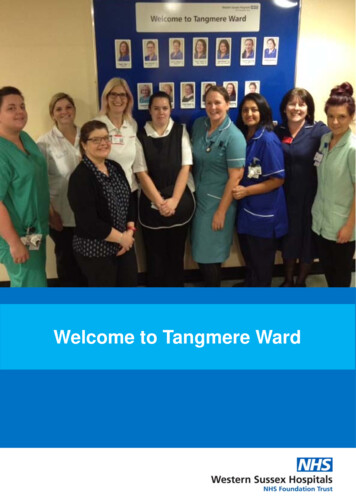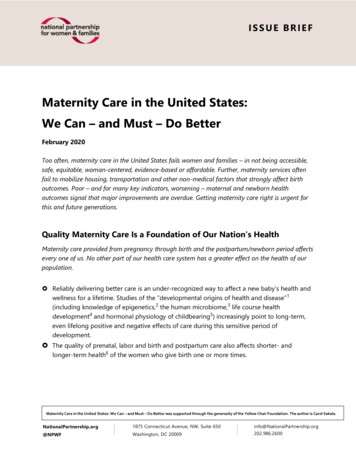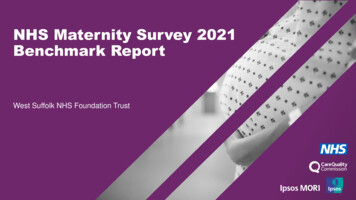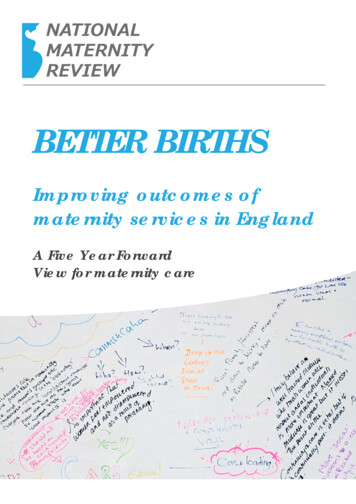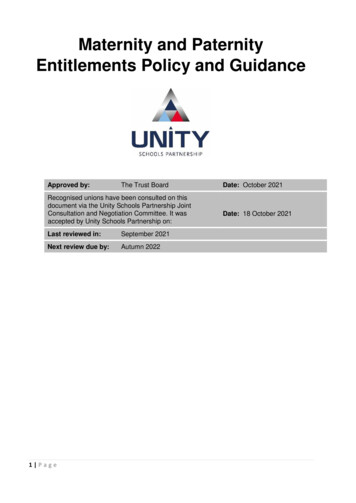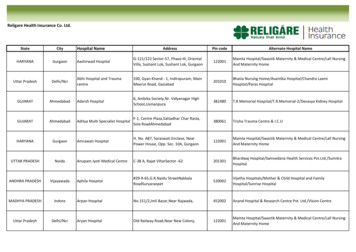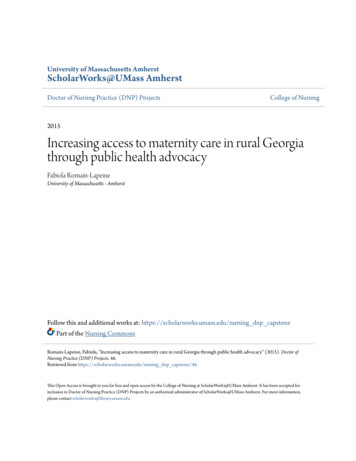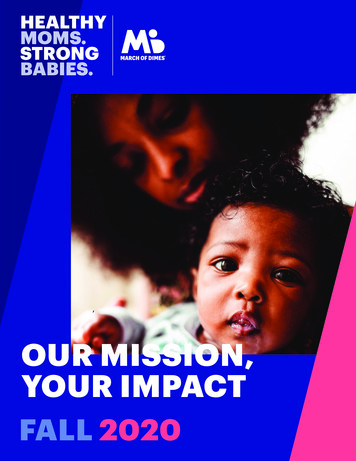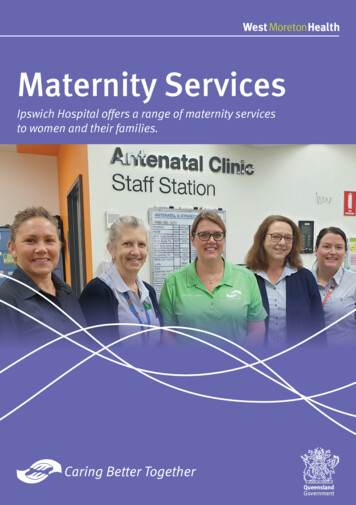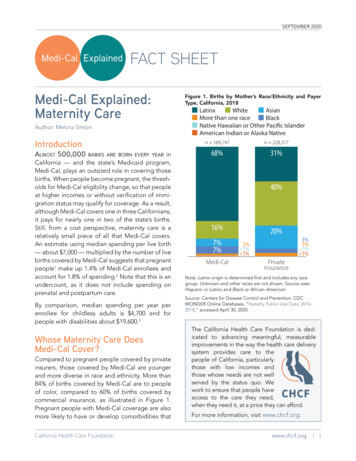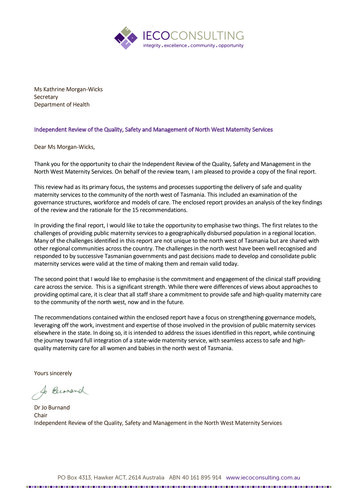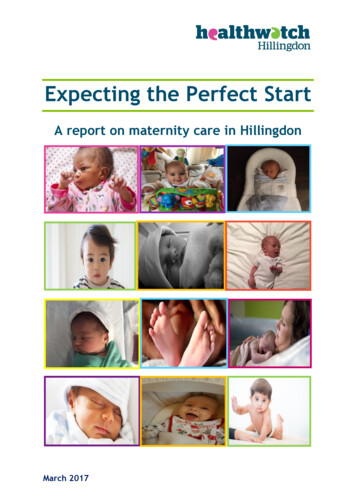
Transcription
Expecting the Perfect StartA report on maternity care in HillingdonMarch 2017
ContentsAcknowledgements .3Executive Summary .4Introduction.7Maternity Project .8Methodology .9Antenatal Feedback .10Labour Care .16Community Postnatal Care .22Perinatal Mental Health .25Focus Groups .27What professionals said .29Area’s to Note.31Conclusion .33Recommendations .34Throughout our engagement programmewomen and families have told us about adedicated workforce who are committed toproviding them and their families withcompassionate care. HealthwatchHillingdon would like to acknowledge thisand say thank you to all the staff within thehospital and across the community whoprovide maternity care in Hillingdon2
AcknowledgementsHealthwatch Hillingdon would like to sincerely thank the women andfamilies who spoke to us during our project. Their open views andhonest opinions of their experiences, have given us a clearunderstanding of the local maternity services provided to women, whogive birth at The Hillingdon Hospital.Throughout our engagement programme women and families have toldus about a dedicated workforce who are committed to providingthem and their families with compassionate care.Healthwatch Hillingdon would like to acknowledge this and saythank you to all the staff within the hospital and acrossthe community who provide maternity care in Hillingdon.We especially thank The Hillingdon Hospital NHS FT, who have workedclosely with us on this engagement programme. They have provided uswith special access, to staff and women, across the whole maternitypathway, within the hospital and community. Without this partnershipworking we would not have been able to produce such acomprehensive report.We express our thanks to the Children’s Centres in both Hillingdon andEaling who opened their doors to our researchers and enabled us tosee the full spectrum of services offered to women and gauge theirexperience of them.We would also like to thank all other the individuals and organisationswho have taken part and assisted us with this project: Hillingdon National Childbirth Trust The various baby clubs we attended Ealing community organisations who facilitated ourworkshops Members of our Volunteer team3
Executive SummaryBackground:In July 2015, Ealing Hospital maternity unit was closed under‘Shaping a healthier future’. An initiative to improve thequality of maternity care in North West London. Consequently,it was estimated that approximately 600 more women woulddeliver at The Hillingdon Hospital. This project intended todiscover the potential effect that the closure has had on thequality of care that women and their families are receiving. Italso aimed to investigate any possible inequalities that mayhave arisen owing to the re-configuration.Methodology:Healthwatch Hillingdon spoke to a total of 251 women. 198 fromHillingdon and 53 from Ealing. This included women who werecurrently using the hospitals maternity service and women who hadgiven birth since the changes. We also engaged professional staff suchas midwives, children centre workers and doctors. The experienceswere collected via a range of methods such as one to one semistructured interviews, survey questionnaires and focus groups.Experiences were collected from women at various locations forexample play groups, children centres, antenatal and postnatal clinics,other voluntary organisation programmes and from feedback collecteddirectly at the Hospital.Outcomes:Our engagement revealed key themes from the feedback raised by thewomen and families, which included: An overwhelming majority of women stating that they were veryhappy with the care and service provision at The HillingdonHospital at every stage of their maternity care. With manystating that the quality of care given at the hospital is of a verygood standard. Families were very pleased with the care and empathy providedby maternity staff. In most cases, women described midwivesand doctors as informative and helpful. Women are very happy with the quality of information they areprovided, however quite a few women said they would havepreferred to have had a verbal explanation in addition toprinted literature.4
Over 50% of women indicated that they were not given thechoice of which hospital’s maternity service they could use. Inthe majority of cases this was because their GP routinelyreferred them to Hillingdon Hospital. Over half of the Ealing women who we spoke to described thedifficulties with travelling to Hillingdon Hospital and explained alack of choices/facilities for antenatal and postnatal services inthe area. From the focus groups targeting women of the BME communityit highlighted the need for greater cultural sensitivity. The feedback also highlighted the need for language serviceprovision for women with language difficulties. Some women explained the need for increased uniformity inbreastfeeding information and support from all healthcareprofessionals. 60% of the 40 women who requested smoking cessation did notreceive this support. Women received mixed experiences of the Triage services,whilst 64% of women were positive about their experiences, 17%highlighted a dissatisfaction due to rudeness of staff and theneed for a reduction in labouring in triage without adequateassistance. Our engagement showed that the perinatal mental healthservice is under pressure with waiting lists rising. This waspartly attributed to Ealing women being referred to theHillingdon service instead of the Ealing service. Both mothers and maternity staff advised us that they felt moremidwives were required.Recommendations:Based on our engagement outcomes we have formulated 8recommendations to help build upon the hospital’s good performanceand further improve women’s experiences.We recommend that:1. There is a review of how information is given, so inaddition to receiving printed literature, women areprovided with more verbal information.2. A review is undertaken of interpreting services to supportwomen who do not speak, or have little understanding ofEnglish, to meet Clinical Maternity -services/guidelines/standards-for-5
3. To review the continuity of care between women andtheir health professionals to meet the expectations ofThe National Maternity Review2.4. There is a review of the referral process between thehospital and The London Borough of Hillingdon whoprovide smoking cessation service.5. The hospital considers introducing a pager system in theantenatal department to allow women the choice ofwaiting elsewhere during their appointments.6. There is a review of the referral pathway for Ealingresidents to the Ealing perinatal mental health service;and that the Hillingdon Clinical Commissioning Group(CCG) review the perinatal mental health service inHillingdon to see how future provision can be met.7. Greater informed choice be given to women concerningwhere they can deliver their babies.8. Hillingdon Clinical Commissioning Group work with TheShaping a Healthier Future team and Hillingdon Hospitalto review the provision of antenatal and postnatal clinicsin .pdf6
IntroductionHealthwatch Hillingdon is completely independent from the NHSand the local authority. We represent the views of everyone whouses health and social care services in the London Borough ofHillingdon. We make sure that these views are gathered, analysedand acted upon, making services better now and in the future.We exist to make health and social care services work for the peoplewho use them.We monitor local services to ensure they reflect the needs of thecommunity, and where necessary, use statutory powers to hold thoseservices to account.Everything we say and do is informed by our connections to localpeople. Our sole focus is on understanding the needs, experiences andconcerns of people of all ages who use services and to speak out ontheir behalf.As part of a network of local Healthwatch from every local authorityarea in England, we are also uniquely placed to raise issues nationallythroughHealthwatchEngland.Reports and Recommendations:Healthwatch Hillingdon produces evidence based reportscommissioners and providers, to inform them of the views andexperiences of people who use health and social careservices in the London Borough of Hillingdon.forCommissioners and providers must have regard for ourviews, reports and any recommendations made andrespond in writing to explain what actions they will take,or why they have decided not to act.Healthwatch have a duty to publish reports they sharewith commissioners and providers, and their responses,in public.Our reports and recommendations are also shared with: Hillingdon Health and Wellbeing Board Hillingdon External Services Scrutiny Committee Healthwatch England The Care Quality Commission7
Maternity ProjectMaternity Care in North West London has been reconfigured under theShaping a Healthier Future programme. Ealing Hospital’s MaternityUnit closed in July 2015 and it was expected that an additional 600women from Ealing will give birth at Hillingdon Hospital’s MaternityUnit in the following year. Births at Hillingdon Hospital were expectedto rise due to these changes and population growth from around 4,000a year to 6,000 by 2018. Approximately 5000 births took place atHillingdon Hospital during 2016 – 2017. We wanted to measure theimpact of the closure of Ealing maternity unit on the experience ofwomen giving birth at Hillingdon Hospital. Healthwatch Hillingdongathered the views and experiences of women who planned to givebirth, or had recently given birth at The Hillingdon Hospital.Our Aims: To determine to what extent, the closure of Ealing MaternityUnit has impacted on the experience of women giving birth atHillingdon Hospital. To identify any potential inequalities that may have arisenfollowing the maternity service reconfiguration. To obtain a greater understanding about the barriers andenablers that shape maternity services. To provide commissioners and providers with evidence baseddata which evaluates current maternity provision and informsfuture delivery.8
MethodologyPreliminary desk- based research was carried out to help inform theproject on current maternity standards, guidelines and gathering local‘best practice’. Data was reviewed from various primary andsecondary sources and included information from: North West London Maternity dashboard Friends and Family Test Maternity Liaison Committee reports Health Social Care Information Centre National Care Quality Commission maternity services survey Royal College of Obstetricians & Gynaecologists National Institute for Health and Care ExcellenceWe used a wide range of methods, that incorporated semi- structureddiscussions, focus groups and online surveys. These were conductedwith individuals who used or were involved with the Maternity servicesat Hillingdon Hospital at all stages from Antenatal care through toPostnatal care. This included expectant mothers, postnatal mothers(baby 0- 6 weeks) recent mothers (baby 6weeks – 12 months),maternity staff, Children centre staff as well as families and spouses.In total, we engaged with and collected feedback from 251 women ontheir experience of maternity services at The Hillingdon Hospital. Theparticipants varied in age and ethnicity to help establish themes andtrends that would be representative of the patient population. Many ofthe children centres within the Hillingdon Borough and 4 within theEaling Borough were contacted to engage with the mothers that usedtheir maternity services and/or baby group sessions. Weekly visits tothe Antenatal and Postnatal wards in Hillingdon Hospital were made tocollect live feedback of patient’s experiences of the maternity care atthe hospital. In addition to this, voluntary services, third sectororganisations and charities such as National Childbirth Trust, werecontacted to capture women’s experiences.9
Antenatal FeedbackWhen you first became pregnant who did you contact aboutantenatal care and how do you rate that experience?46% of respondents contacted a GP to obtain information aboutantenatal care once they discovered they were pregnant, whilst 54% ofrespondents self-referred to the hospital via the online referralsystem. The majority of service users stated that they had a positiveexperience at this stage and were satisfied with the information theyreceived describing the online self-referral process as‘straightforward’ and ‘easy to navigate’.However, for service users that were referred to Hillingdon Hospitalvia their GP some highlighted the absence of hospital choice beingoffered with generally little information given to them by their GP.This was evidenced with 51% of respondents stating that they were notgiven a choice of hospitals to have their baby, many of which were GPreferred.Most women elected to deliver at The Hillingdon Hospital because itwas the nearest hospital to them and many previously delivered there,while a smaller number self-referred based on Hospitalrecommendation and reputation.Where did you have your first ‘booked appointment’?Almost 80% of expectant mothers had their first booked appointmentwith a community midwife or a hospital consultant. The remaining 20%had their booked appointments with hospital midwives. When asked atwhich stage in their pregnancy they had their first bookedappointment, 83% of expectant mothers had their first appointmentwithin the first 12 weeks of their pregnancy. For the 16% of expectantmothers who stated that they had their booked appointment at 13weeks or later, a large majority attributed this to late recognition ofpregnancy with many stating ‘didn’t know I was pregnant’and others explained that personal relocation was the cause of theirlate appointment. A very small number of women explained that thereason was due to a delay in receiving an appointment date by thehospital or a lack of their own availability.Were you offered help to give up smoking during pregnancy?In total, approximately 77% of expectant and recent mothers did notsmoke therefore did not require any stop smoking support. However,for the women who did smoke only 16 were offered smoking supportwhere 24 women were not. We found that the majority of women who10
received smoking support were individuals with special medical orsocial care needs, that therefore needed more care. Where women didnot receive smoking support, they told us it was because nobody hadcome back to them with further information. Whereas in other cases,conflicting information given by health professionals left womenunclear about where to seek support or who to seek support from.“I requested for help to stop smoking and was told thatI would get a phone call from the midwife that does thereferrals, well that phone call never came and when Icalled up a few weeks later to chase this up I was toldthat that day was her last day before she went onannual leave so I should go to my local pharmacist toget whatever they had to help quit smoking.thiswas so unhelpful and extremely unsupportive.”“I was supposed to be referred to someone aboutstopping smoking, was waiting on the appointment butit never came. I ended up stopping on my own but a bitof support would have been nice though”“still awaiting smoking support a bit confused as towhen I’m going to be seen”We investigated this further during our research. Women are referredby the hospital to the smoking cessation service provided by TheLondon Borough of Hillingdon. We found that the referral process wasnot working as efficiently as it could be. After discussing this with thesmoking cessation team and the Hospital, work has been undertaken toreview the referral process and a new pathway is being developed.During your pregnancy, did you have a named midwife or midwiferyteam that you could contact?The National Maternity Review 2016 states that:‘‘Every woman should have a midwife, who is part of a smallteam of 4 to 6 midwives, based in the community who knows thewomen and family, and can provide continuity throughout thepregnancy, birth and postnatally.’’Only 55 expectant mothers of the 156 who responded to this questionstated that they had a named midwife or midwifery team. For most11
women, this did not seem to affect them as they still said the qualityof care given at the hospital is of a very good standard. Where this was‘I kept getting seen by differentmidwives which was a little frustrating because I kepthaving to give my information repeatedly to each onebecause the information wasn’t being passed on toeach midwife’.an issue it was stated thatOf the women that did contact their midwives during their pregnancya majority reported that the service they received was‘veryhelpful’.In particular, some expectant mothers with high riskpregnancies expressed that ‘the staff were really helpful every time’.Likewise, another expectant mother stated that‘I had gestational diabetes during my pregnancy and theteam were really helpful with advising me on what to eatand what type of exercises I should be doing so that washelpful’Did you attend birthing/antenatal/parent education classes?When we inquired about expectant mothers’ antenatal classattendance 67% stated that they did not engage with antenatalclasses. The cause of this included factors, such as non-eligibility fornon-first time parents, and a general lack of perceived necessity of theclasses. For the 32% of mothers that did attend antenatal classes, inparticular those held at The Hillingdon Hospital, mothers said thatclasses ‘were very helpful’.12
Did you feel involved in the choices and decisions made about yourcare?We asked mothers whether they felt that they were involved in thechoices and decisions made about various aspects of their pregnancy.The table shows that across many areas expectant mothers highlightedthey believed that they were involved and given a choice concerningvarious aspects. Though our feedback shows that expectant mothers atthe hospital are being offered choices, there is more work that can bedone to help ensure there is a reduction in the number of mothers whodid not feel they had a choice or their choices were not adhered to.Keeping Women Involved and giving choiceYesNoWhere to have the antenatal classes4811Where to have screening checks145 16The birth plan120 39Where to give birth124 32What kind of birth to have129 32Positions in which to give birth122 39How to manage the pain of labour134 26Please tell us what went well?When asked about the helpful factors that made their antenatalexperience the majority stated they were very happy with the overallcare given by the hospital and community midwives. The HillingdonHospital Maternity staff as well as Children Centre staff in charge ofantenatal support (such as bump and beyond practitioners). In additionto this, for women who stated that they experienced complicationsduring their pregnancy they specified, that generally staff effectivelymanaged and assisted them throughout the pregnancy givingappropriate support when required.“I developed gestational diabetes and the antenatalteam were really reassuring and told me what I shouldand shouldn’t be eating and how to stay healthy’’“My wife decided that she wanted a home birth andwas very happy with the antenatal care we were givenby the home birth team”“antenatal care had great monitoring, I had preeclampsia in my previous and recent pregnancy, whenpre-eclampsia symptoms started arising again theyadmitted me into hospital for a week ”13
Please tell us what did not work?Overall, Mothers expressed their satisfaction with the care provisionthey received. However, there were 63 mothers that expressed theirdissatisfaction concerning some areas of their antenatal care service.In particular, 25% commented on excessive waiting times, discomfortand overcrowding in waiting area, 20% in a lack of consistency withhealth professionals seen, and 30% general lack of effectivecommunication between patients and the hospital.With regards to waiting times, mothers said that they are rarely seenat their appointed times, with waiting times being more than 2 hourslong. In many instances mothers state that there was nocommunication given to them explaining the cause of the delay orproviding information to help estimate waiting time.For women who had previously delivered at the Hospital many statedthat waiting times were significantly worse in comparison to theirprevious experience. A small minority perceived this change to be dueto the influx of women following the closure of Ealing Hospital. Serviceusers described that due to not being seen on time, there werefrequent occasions that the antenatal waiting area became excessivelycrowded and uncomfortable due to the arrival of new appointmentsclashing with pending appointments. This not only had a negativeimpact on women’s comfort but for some disrupted work schedulesand/or child care arrangements. Women who required theaccompaniment of a spouse, family member or friend to help withlanguage translation - predominately Ealing/ Southall mothers - saidthat this often compromised their ‘translator’s’ availability toaccompany them, which meant they did not fully understand what wassaid to them.“I don’t think that the structure of the antenatal careward is right, it gets really overcrowded at timesbecause of the long waiting times and it’s hard to wantto get up and go for a walk because you’re scared tomiss your appointment. It’s a bit frustrating becauseafter waiting hours for your appointment when you areactually seen you’re only there for 10/15mins”“The amount of information I was given seemed fairlylimited in comparison to some of the information myfriends told me they got, I got given a lot via leafletswould've preferred being spoken to”14
A problem associated with these excessive waiting times for a verysmall percentage of women was the decrease in their desire to attendhospital appointments as they were reluctant to dedicate a whole dayfor appointments.A lack of consistency with health professionals seen by expectantmothers was shown to have a negative impact on the information givento them and their continuity of care. Mothers specified that this lackof consistency, inadequate note taking and breakdown incommunication between staff caused a discrepancy with theinformation given to them by the various health professionals.“Lack of consistency with the midwives and staff that Isaw so I had to repeat information over and over todifferent staff”Please tell us what would have made the experience better for you?When asked to comment on areas of improvement within the antenatalpathway (excluding the requests for a reduction in waiting times andbetter communication) a few expressed the desire for the hospital toincorporate text messages or alerts that notifies them when they aregoing to be called in for their appointments. They stated that thiswould provide them with the opportunity to walk around or wait in amore comfortable environment, if they wished to. Furthermore,mothers explained the desire to be given information verballyconcerning issues such as birthing plans, options of pain medication,where to go for antenatal classes provision and what types of birththey could have as opposed to just leaflets. Though these documentscontain the relevant information, mothers (particularly first timemothers) stated a preference of speaking through these options withtheir midwives. Some women explained the frustration of having towait until subsequent appointments to discuss elements of their careand birth that they had, after reading the literature at home.“a lot of information was given to me by leaflets andbooklets but would’ve liked a bit more verbal information”“would’ve preferred to have the various options explainedto me rather than just given booklets and leaflets15
Labour CareAt the start of your labour, did you contact your midwife, hospitalor birth centre for advice? If yes, please tell us about yourexperience when you contacted them?Mothers were asked whether they contacted the hospital triage ortheir midwife at the start of labour. Of the 164 responses 58.5% statedthat they did and 41.5% stated that they did not. The reasons for notcontacting medical advice at the onset of labour varied. A few reasonsincluded; pre-scheduled inductions and personal decision. For the 51women who told us of their experience of contacting triage, manystated that they had a very positive experience as triage responded totheir queries in a timely manner, provided relevant information andadmitting them into hospital when needed.“Triage were great very informative”“Triage were amazing, I came in multiple timesthroughout my pregnancy and they were great everytime”However, approximately 35% fed back that they were unable to accessmedical advice within a reasonable time- period, many saying thatthey were left on hold for approximately 30 minutes or more beforegetting through to triage. This resulted in them coming straight to thehospital. Women also spoke about impoliteness of triage staff, a lackof acknowledgement of the patient’s judgement and delays inreceiving medical attention.“pretty helpful, once I got through to them but thatwas after waiting on the line for about 30mins”Though women highlighted their awareness of the current NHSpressures and increasing demands placed on staff, some felt thattriage did not have the adequate resources to support them in activelabour. This made some women’s experiences quite challenging with10 saying they did not feel fully supported with pain managementwhilst waiting in triage.“I had a very bad experience. I was left waiting intriage without being attended to. I was given no painmedication to assist just gas and air plus it was not verycomforting when you’re in labour and others aroundyou are just there for appointments”16
For a small minority of women, they believed that having a negativeexperience at the onset of labour had a negative impact on the rest oftheir maternity experience.If you had a birth partner, were you both happy with the way theywere involved with the birth? Please let us know the reason for theanswer.For women who had birthing partners present during their birth theyexpressed that health professionals were very efficient with ensuringthat both parties were involved with the birth at every stage. 88% ofrespondents stated they were pleased with the level of involvementthat staff gave to the birthing partners.“Because I was in a lot of pain I couldn’t reallyunderstand everything I was told so it was reassuringthat they spoke to my boyfriend and gave him the sameamount of detail that they gave me so he knew whatwas going on with me and the baby”“They were extremely nice to him and supportive of usboth”Did you have skin-to-skin contact with your baby shortly after thebirth? If no, was there a reason.In line with NICE guidelines, 84% of women who delivered at THH hadskin-to-skin contact with their babies shortly after the birth. Out ofthe 15% of women who did not have skin to skin contact a largeproportion attributed it to delivering via caesarean section orexperiencing medical complications during or after the delivery. Inmost cases this meant that the new born baby had to be taken awayfrom the mother.17
How do you rate the support you received in each of these areas?Women were asked to rate their experiences on some areas of theirmaternity care. This included; breastfeeding advice, emotionalsupport, food and drink and advice/ information given after birth.With the exception of breastfeeding, all areas received positiveresponses with approximately 70% satisfaction rate. In the case ofbreastfeeding, 59% of women stated that they had a positiveexperience and received adequate support with the breastfeedingadvice given at Hillingdon hospital. Though it is evident that HillingdonHospital are currently providing a very good breastfeeding service webelieve that some improvements can still be made. The two areas ofdissatisfaction that were highlighted were firstly, the inconsistencywith breastfeeding information provided by maternity staff createdconfusion for mothers attempting to learn how to breastfeed. Thiswas particularly daunting for first time mothers as it left them feelingvery unsettled and uncertain. Secondly engagement with somemothers, mainly first time mothers, highlighted the desire for moresupport provided by midwives on the postnatal wards after delivery.“the midwives at the hospital were giving slightlydifferent information about how to breastfeed,however one thing that I didn’t like was that I wasmade to overly needy because I actually wanted themidwife to stay with me for an extra few minutes toensure that I am breastfeeding correctly. My babylatched once and then they were of, they didn’t stay soI didn’t get a chance to explain that breastfeeding wasactually becoming extremely painful”“one midwife was really emotio
Maternity Care in North West London has been reconfigured under the Shaping a Healthier Future programme. Ealing Hospital's Maternity Unit closed in July 2015 and it was expected that an additional 600 women from Ealing will give birth at Hillingdon Hospital's Maternity Unit in the following year.
